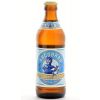Arcobräu Gräfliches Brauhaus - Mooser Liesl Helles
-
ABV:
5.3% -
Bottle Size:
330-ml -
Serving Temperature:
45-50° F -
Suggested Glassware:
Pilsner Glass, Flute
Pouring a bright golden straw color with crystal clarity and a vibrant cap of foam, this helles lager offers up an inviting aroma. We picked up plenty of pale malt character offering fresh baked bread and crackery notes, topped by floral and lightly fruity hops with touches of spice and earth. For us, the hops and malts come together to conjure a sort of mild tree fruit impression. On the palate, look for the malt profile to come through fairly robustly, not dark, of course, but satisfyingly round with rich bready notes and a touch of residual sweetness that is true to style. Helles (which means “light” or “pale” in German) lagers tend to be richer than many other pale lagers, including German pilsners which tend to veer more toward hop expression. The hops here do offer a mild bitter counterpoint, and, as in the aroma, there’s a touch of fruitiness that reminds one of apple flesh. Difficult to brew properly, and emblematic of top-shelf traditional German lager brewing, Mooser Liesl makes an excellent brew on its own, but pairing options abound among lighter or not highly spiced fare. Salads with grilled chicken, lightly grilled fish, fried chicken, schnitzel, mild cheeses, or a salty soft pretzel would make our day with this brew. Prost!
The history of Arcobräu Gräfliches Brauhaus is inseparably tied up with the history of the Counts or Arco. In fact, “Gräfliches Brauhaus” translates as “Count’s Brewery.” The Counts of Arco originally hailed from Italy, where their Castle Arco towers over the northern shore of Lake Garda from a massive, rocky prominence. With 16th century European political struggles being particularly nasty and violent, the family ultimately had to leave Italy, settling instead in a new domain in Bavaria.
About 90 miles northeast of Munich, about equally distant from the nearby Czech and Austrian borders, lies the town of Moos, Bavaria. Surviving documents indicate that the Schlossbrauerei (“castle brewery”) of Moos was up and running by at least 1567. Numerous important events occurred over the centuries, notably the brewery's destruction by fire in 1619 and its subsequent rebuilding, the combining of breweries in Moos and the nearby town of Aholming, and a modernization occurring in the late 19th century, which brought mechanization to the brewing process. 1910 would see the introduction of their first helles lager, which would become a flagship product which endures to this day.
For hundreds of years, the Counts of Arco have been at the helm of this traditional Bavarian brewery, and today the brewery is owned by Count Riprand von und zu Arco-Zinneberg. The Count, who is married to Archduchess Maria Beatrice of Austria, inherited ownership after the passing in 2003 of his mother, Countess Maria-Theresia, who was the granddaughter of King Ludwig III, the last king of Bavaria. Got all that? In any case, Countess Maria-Theresia took over control of the brewery as a young lady in 1940 after the death of her brother, and in 1960 she and her husband, Count Ulrich Philip, combined all their breweries under one brand name, Arcobräu, with the Schlossbrauerei Moos as the headquarters.
Arcobräu continues to grow steadily while sponsoring community events, including various yearly folk festivals, including the public tapping of their highly anticipated Coronator doppelbock. Using pure water from their over 300-feet-deep well and yeast that they propagate from Weihenstephan’s world-famous strain, the brewery produces a very tasty array of traditional German beers including several helles lagers, dunkel, doppelbock, pilsner, zwickelbier, and weissbier. If you're ever traveling near Moos, a tour of the brewery is highly recommended; or better yet, visit during one of their folk festivals!

Unmatched Variety by style, brewery & country
Choose from Five different Beer Clubs offering unmatched variety by brewery,
country of origin, and beer style to suit your specific tastes.


